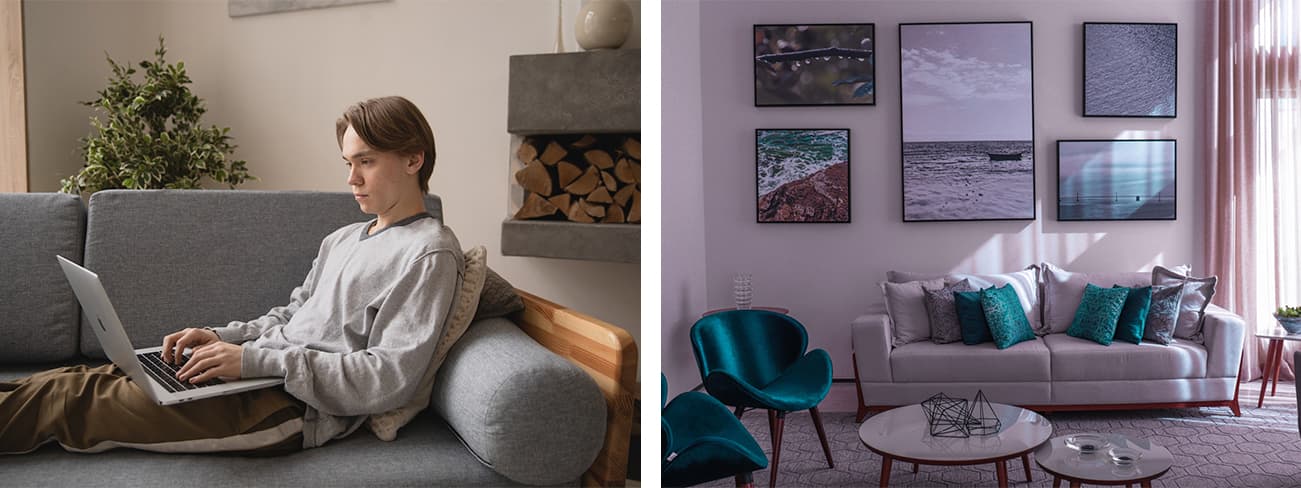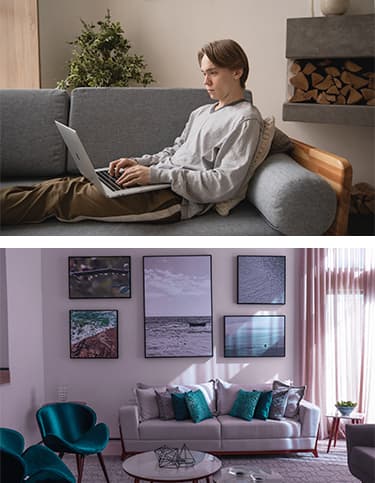How Does Your Physical Environment Affect You and Your Mental Health?
Reading Time: 6 minutesOur everyday surroundings have a powerful impact on our mood and emotions. A dark, cluttered room evokes different feelings than an airy, light-filled space. But the impact goes beyond our immediate reaction—for example, one study found that living in a cluttered home can actually stimulate the production of cortisol, the stress hormone. So exactly how does your physical environment affect you, particularly if you’re spending all your time in one place, as many of us are these days? Let’s look at what mental health experts and researchers say about how your mind reflects your surroundings—and how you can change your environment to lift your mood.
The Link Between Physical Environment and Emotional Well-Being
How your environment influences you isn’t just a matter of whether you find it visually pleasing. In fact, when we spend a lot of time somewhere, we no longer really notice what’s around us. The piles of paperwork on your work-from-home desk or the laundry spilling out of your closet seem to disappear when you stop paying attention to them for a few days, or a few weeks. That’s due to a phenomenon known as habituation—sometimes called “attentional blindness.”
But just because you’re not consciously focusing on your surroundings doesn’t mean they’re not taking a toll on your mental health. The way your room smells (how long has that pizza box been sitting on the bureau?), how warm or cold it feels, and the sounds in the space are as important as what we see, as your mind reflects your surroundings. In fact, young adults who are spending all day in their rooms on their computers, working remotely or attending virtual college classes, are mostly looking at their screens. But their other senses are continually taking in various stimuli, like the temperature, scents, and noises in the room.
Whether you’re living in a city or the country, at home with your family or with roommates, in a new apartment building or an old farmhouse, your immediate environment influences you and your state of mind. And it goes the other way as well: Your mood will be reflected in your space. For example, people who are depressed often don’t have the energy to clean, organize, or open the windows to let in light and air. This creates a kind of vicious cycle, as the environment becomes another factor contributing to poor mental health.
How Does Your Physical Environment Affect You? A Look at the Research
Scientists have been exploring the impact of our environment on our health for decades. In her book Healing Spaces: The Science of Place and Well Being, researcher Esther Sternberg cites studies done by environmental psychologist Roger Ulrich. In his most well-known study, Ulrich compared how quickly patients healed after gallbladder surgery. He found that the patients who were put in a room with a view of a grove of trees consistently healed faster than those whose windows looked out on a brick wall.
Along with a view of nature, light plays an important role in physical and mental health. Light directly affects our circadian rhythms—the biological clock that tells us when it’s time to sleep—and sleep habits are closely linked to mood. Insufficient levels of natural and/or artificial light in your room can catalyze stress and anxiety. Neuroscientists at the University of Pennsylvania found that rats who were kept in the dark for six weeks exhibited depressive behavior. In addition, the researchers observed damage in the areas of the rats’ brains that produced norepinephrine, dopamine and serotonin, the neurotransmitters involved in emotion. These are the same areas of the brain that are under-active in people with depression. In addition, light that’s too bright at night disrupts sleep and therefore mood.
Furthermore, how messy and disorganized our space is directly influences our mental health. In a study of women’s cortisol levels compared to their husbands’, the wives with cluttered homes had higher stress and a more depressed mood. Along with lowering well-being, clutter has also been linked to reduced executive functioning, as well as procrastination, reduced productivity, and emotional exhaustion.
Know the Facts
Too much light in your bedroom while you’re sleeping can increase the risk of depression by 63 Percent.
Three Ways Space Can Impact a Person
You may not even realize how your environment influences you—both your mindset and your behavior. Here are three examples of how the environment you live in affects you:
- Clutter leads to more snacking. Research shows that clutter increases our likelihood of making poor food choices. In a study with college students, participants in chaotic environments ate more cookies. This is significant because sugar has a negative impact on mental health. Disorganized workspaces also tend to make us more vulnerable to other distraction tactics, like watching TV or scrolling social media.
- A messy room can influence you to make bad decisions. Disorderly environments can impair people’s judgment and encourage them to act impulsively. That might translate into online buying sprees between remote classes, or posting that picture on Instagram that you probably shouldn’t have.
- Your room can either invite or discourage connection with others. If every space in your bedroom is covered with clothes or books, and the only place to sit is your bed, family members—or your roommate—are less likely to spend time there. For some people, that might seem like a good thing, particularly if your bedroom is also where you work or go to school, which is the case for many young adults right now. But ultimately, creating a more inviting environment that others feel comfortable in will help you feel less isolated in your own space and your own mind.
Because the mental health effects of our environment are so powerful, trauma-informed care extends to the spaces where outpatient therapy, residential treatment, and therapeutic modalities take place. Relaxing colors, comfortable furnishings, and lots of light help create a healing environment.


How to Create an Environment That Lifts Your Mood
The good news is that there are easy ways to control how your environment influences you and your mental health. Try these strategies for creating a healing space, and notice if your mind reflects your surroundings.
- Increase natural light in your room by replacing curtains with blinds that can be pulled all the way up during the day, and all the way down at night to create an environment more conducive to sleep. Hanging mirrors creates more brightness by bouncing the natural light around the room. Make sure that areas where you read are brightly lit. In addition, desk and table lamps create a more relaxing ambience than overhead lighting.
- Color impacts mood, so consider painting your room, or even one wall of your room, with a bright, light color. A soft shade of white or pastel will help reflect light as well.
- If you don’t have a view of nature outside your window, bring nature inside with potted plants, a tiny herb garden, or fresh flowers. Even a photo of nature can make a positive difference.
- This one’s a no-brainer: Organize your space, getting rid of clutter and finding ways to sort and store what you do decide to keep. You don’t have to do it all at once; spend an hour or even 15 minutes on one area, then return to the task the next day, to avoid feeling overwhelmed.
- Use aromatherapy to make your room a happier place. Keep a spritz bottle of lavender or rosewater at your desk, or small essential oil bottles to sniff when you need to shift your mood. Different scents have different effects—lavender is calming, peppermint is energizing, and so on.
- Many people find that working with music in the background improves concentration and well-being. Try different kinds of music to see which works best. At night, make your sonic environment more conducive to rest with white noise, like a quiet fan or ocean waves.
- If you’re working or attending school from your bedroom, you may have developed a tendency to stay in bed with your laptop—if so, you are not alone! However, if your room is large enough, use a desk for work and reserve your bed for sleep and relaxation. This will improve your focus during the day and your sleep quality at night.
These are some of the most important factors to look at when considering the question of how does your physical environment affect you. However, if your low mood persists, professional help is the essential next step. Enhancing your space can be helpful for well-being, but it can’t address the underlying causes of depression, anxiety, and other mental health disorders. Contact us today to learn more about how Newport Institute’s integrated, personalized approach can guide you or your loved one to sustainable healing and a thriving future.

